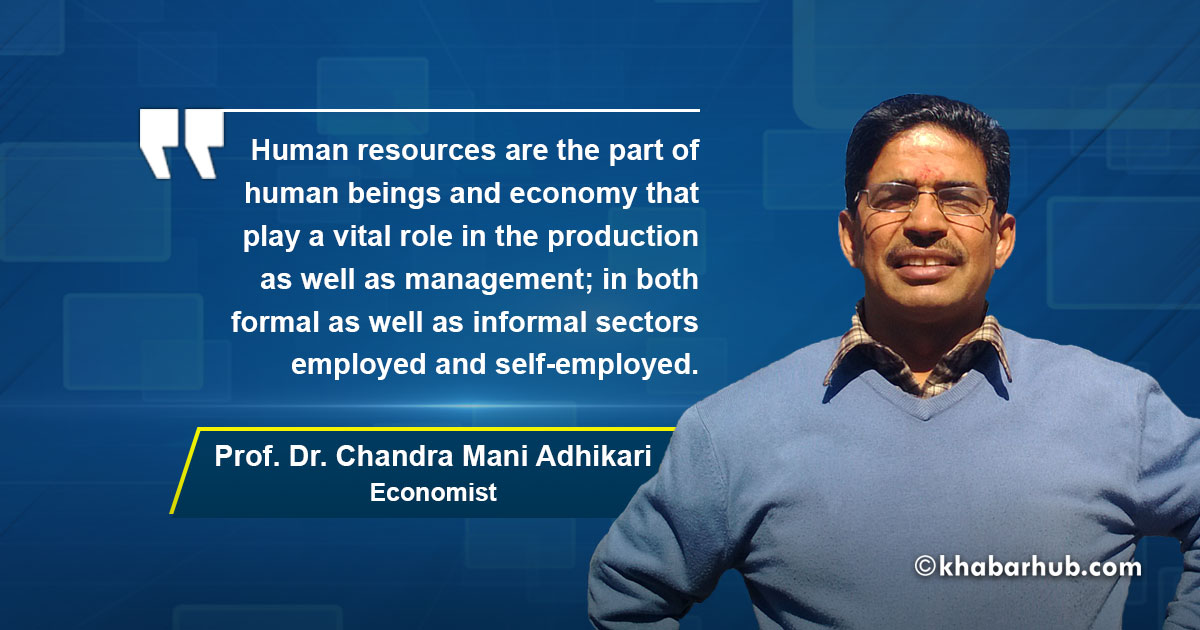0%

If development is based on human capital, technology & innovation, we can surely assume that it is a knowledge-based sustainable economy that makes people happy and the economy sustainable.
Economy and Economics
In layman understanding, economics has a close and intimate relationship with the word ‘economy’; both love each other, coordinate each other. The economics is known as a social science that studies the production, distribution, and consumption of goods and services focusing on the behavior and interactions of economic agents and the working model of an economy.
On another hand, an economy is concerned with effective and meaningful use of money, resources, and other means of production. It treats the world as a marketplace and deals with the flow of money. In economy and economics, the labor force stands in the center and provides liveliness in overall activities.
In modern perception, it is an aggregate of physical, mental and heart feeling efforts that are used in the creation of goods and services; as a primary factor of production, measured in the name of productive effort. The knowledge affiliates with both, economy and labor force.
The labor force involves in both stages of economic activities: production, processing, and sales, basically intensively in production and processing phases. In this sense, economics is the study of the process of decisions that are taken in the face of scarcity; in the name of individual decisions and family, business or societal decisions.
In advance terms, the economy is a kind of system that teaches the people about making money and use of it within a particular area, country or region.
So it is familiar calling as the economy of the country, region, and location. For example the economy of Nepal, South Asian Economy or Economy of Province Number 3. The labor traditionally is related to physical force or effort of human beings.
In modern perception, it is an aggregate of physical, mental and heart feeling efforts that are used in the creation of goods and services; as a primary factor of production, measured in the name of productive effort. The knowledge affiliates with both, economy and labor force.
This is a vital part of the economy that enhances the quality and capacity of the economy as well as human effort. This observation communicates us that labor force is a very important part of the economy; since in absence of labor or human mind and its physical effort as well as consent and motivation in work, the economy will be left as an empty vessel; no mind, no heart.
In addition, the labor force is not only the part of production; it is one of the actors of market and consumption decision and action. Human resources are the part of human beings and economy that play a vital role in the production as well as management; in both formal as well as informal sectors employed and self-employed.
In such sense, human capital is advanced stock of labor force that is created through blending the core labor force with knowledge, skill and technology that enhances the labor productivity and competitiveness.
Thus, it can be concluded that the human capital force is basic foundation of the economy of the country; that means if the labor force of any country is knowledge based, qualitative and competent, definitely the economy of such country will be strong; the growth will be inclusive and broader; consumption and market will boost up.
From another point of view, if the human capital of the country is knowledgeable, skilled, technology based and innovative, it opens the door of the knowledge economy (KE).
Conversion of Economy in Knowledge-Economy
In knowledge economy (KE), knowledge can play a role of the heart and mind in the economy through human and artificial intelligence. This is created and blended with skill, assessed, modified, used in production and traded in the national and international market where labor costs become progressively less important.
To convert our economy in the KE, we should identify the major components of the KE and should invest in education, largely in a qualitative way.
It is a system that is based on intelligence or intellectual capital; it is not only the matter of financial issues; since, the KE concerns to brainpower as well as other intellectual based resources. In simple understanding, the KE is based on production, distribution and utilization of knowledge, skill and information as fundamental enablers of growth, wealth creation and employment that ask for an efficient and modern education system.
Therefore, if we want to drive our economy as knowledge economy we should improve our education system in overall.
In KE, the production of goods and services depends on knowledge-intensive activities; knowledge intensive activities are possible only there where the education system is supportive for that, where workers and firms both are committed to learn and increase their skills and expertise ever-time; since education is the main engine of knowledge economy.
To convert our economy in the KE, we should identify the major components of the KE and should invest in education, largely in a qualitative way.
In addition we should convert the industry and management in knowledge industry and knowledge management with adjustment of major economic activities (primary, secondary and tertiary) under the KE framework.